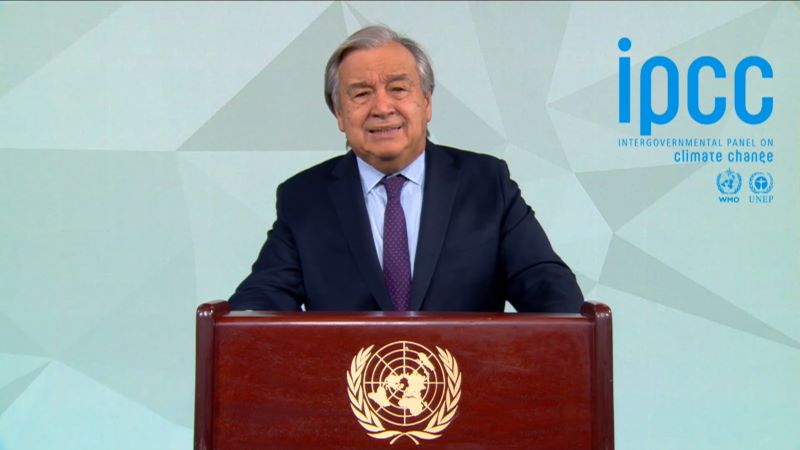The Intergovernmental Panel on Climate Change’s latest and final climate report warns that time is running out to be able to avoid the most catastrophic impacts of a rapidly overheating planet.
Authors of the report, released March 20, contend that governments around the world have about a decade to stop the rise of global temperatures and the extreme weather events that accompany them. They also lay out a clear path to prevent global temperatures from rising above 1.5°C.
United Nations Secretary-General António Guterres described the report as a “survival guide for humanity” during a March 20 press briefing and called on governments around the world to accelerate achieving their net-zero goals by a decade. For the U.S. and other developed nations, that would mean the target for net-zero emissions would be 2040, compared to 2050, with all countries in the world reaching global net zero by 2050.
Keeping global warming from rising more than 1.5° is “achievable,” Guterres said, but “every country must be part of the solution.” He also implored CEOs of oil and gas companies to accelerate the phase-down of coal and other fossil fuels while ramping up renewable power sources and projects.
Guterres said the latest IPCC report will provide a framework for updated, more stringent commitments for emissions reductions at the upcoming United Nations Climate Conference in Dubai, COP28, to be held beginning on Nov. 30.
The report is a synthesis of its Sixth Climate Assessment Cycle reports released between August 2021 and April 2022 and represents the work and opinions of 93 scientific authors worldwide. It was approved by the IPCC panel after a weeklong series of meetings in Interlaken, Switzerland.
A Pathway to a Livable Future Exists
The IPCC’s authors say that multiple, feasible and effective options to reduce greenhouse gas emissions exist and are widely available now. “Mainstreaming effective and equitable climate action will not only reduce losses and damages for nature and people, it will also provide wider benefits,” IPCC Chair Hoesung Lee said in a statement. However, these efforts need to begin almost immediately across virtually every sector of society. “Keeping warming to 1.5° C above pre-industrial levels requires deep, rapid and sustained greenhouse gas emissions reductions in all sectors” over the next decade, the IPCC concluded.
Effective emission reduction efforts include climate resilient development, the rapid phase-down of fossil fuels, and carbon dioxide removal through such methods as direct air capture, the report authors said, as well as more equitable distribution of climate finance resources. “Climate justice is crucial because those who have contributed least to climate change are being disproportionately affected,” said Aditi Mukkerji, one of the report's authors.
The report notes that progress in adaptation planning and implementation practices such as wetland restoration, urban greening and sustainable land management practices has occurred “across all sectors and regions, generating multiple benefits.” However, “most observed adaptation responses are fragmented, incremental, sector-specific and unequally distributed across regions.”
Frank Maisano, a founding partner of Bracewell’s Policy Resolution Group, based in Washington, D.C., says the IPCC authors create a more dismal picture than is perhaps warranted. “They tend to always take the worst look at the climate challenge that never reflects the political and cultural challenges to imposing overly dramatic limitations. They also often disregard significant environmental and technology progress already made, underway or expected in the near-term,” he says.
But Ani Dasgupta, president and CEO of the World Resources Institute, comments: “IPCC scientists don’t mince words on the biggest threat to humanity: continuing to burn fossil fuels.” However, “despite the dire warnings, the IPCC offers reasons to be hopeful, [showing] a narrow path to secure a livable future if we rapidly correct course.”





